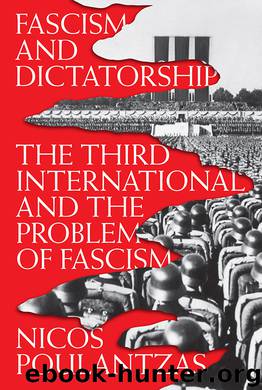Fascism and Dictatorship by Nicos Poulantzas

Author:Nicos Poulantzas
Language: eng
Format: epub
Publisher: Verso Books
3
Italy
I. THE PROCESS OF DEFEAT AND THE DEFENSIVE
I shall again concentrate mainly on the differences between the Italian and German cases, and particularly on those aspects in which the initial propositions are more clearly illustrated by the Italian case than by the German.
Firstly, the rise of fascism, and the preceding period as well, were again a very concentrated experience for the proletariat. The stabilization period between the turning point of the defeat and the start of the rise of fascism was especially brief in Italy. The process of defeat in this case saw no attempt at insurrection in the full sense – apart from a local insurrection in Turin in 1917. The proletarian offensive essentially took the form of strikes, in particular of political strikes. The process of defeat nevertheless took place in a continuous ‘veiled’ civil war between the two forces in operation.
In Italy too, the end of the war saw an exceptional revolutionary development of the working class.1 Expressed in a whole series of strikes and mass political actions, this development culminated in an objectively revolutionary situation: the political general strike of 4 July 1919. Soviets appeared all over the place and took over authority, and fraternization between troops and workers became quite widespread. But the ‘revolutionary’ political strike of 20 July, which should have taken the struggle on from there, was a failure.
After a period of relative calm, the strike movement gained impetus the following year. In August 1920 it culminated in a general strike with factory occupations. Every factory was then placed under the direction of a workers’ council (consiglio difabbrica) which ensured its functioning: an agreement with the workers’ cooperatives made it possible to go on paying wages. Was this an objectively revolutionary situation and a ‘missed opportunity’? Again, opinions are divided. It was none the less a situation of open crisis, and held certain possibilities for the workers’ movement.
But the movement remained isolated in the factories. The ‘neutral non-interventionist’ Giolitti was content just to encircle them with the troops occupying the industrial cities – and the movement was doomed to failure. The strikers won only the recognition in principle of some vague workers’ control in the factories. Commissions were set up to deal with disciplinary relations between employers and workers, and with productivity increases, but these included management representatives in equal numbers, and were never formalized by law. On 27 September the workers abandoned the factories. After a short period of stabilization, the beginning of 1921 saw the start of the rise of fascism, and the working class already moved onto the defensive.
But the working class had won some important political and economic gains in the process: substantial wage increases; an eight-hour day; the generalization of collective bargaining; factory committees; direct universal suffrage; and relative autonomy in the management of community affairs in the red areas. These gains were constantly undermined during the rise of fascism, but the representatives of medium capital allowed them to persist to an extent unacceptable to big capital, up to the time fascism came to power.
Download
This site does not store any files on its server. We only index and link to content provided by other sites. Please contact the content providers to delete copyright contents if any and email us, we'll remove relevant links or contents immediately.
| Anarchism | Communism & Socialism |
| Conservatism & Liberalism | Democracy |
| Fascism | Libertarianism |
| Nationalism | Radicalism |
| Utopian |
The Secret History by Donna Tartt(19093)
The Social Justice Warrior Handbook by Lisa De Pasquale(12191)
Thirteen Reasons Why by Jay Asher(8912)
This Is How You Lose Her by Junot Diaz(6889)
Weapons of Math Destruction by Cathy O'Neil(6281)
Zero to One by Peter Thiel(5802)
Beartown by Fredrik Backman(5759)
The Myth of the Strong Leader by Archie Brown(5510)
The Fire Next Time by James Baldwin(5449)
How Democracies Die by Steven Levitsky & Daniel Ziblatt(5219)
Promise Me, Dad by Joe Biden(5154)
Stone's Rules by Roger Stone(5088)
A Higher Loyalty: Truth, Lies, and Leadership by James Comey(4965)
100 Deadly Skills by Clint Emerson(4927)
Rise and Kill First by Ronen Bergman(4790)
Secrecy World by Jake Bernstein(4754)
The David Icke Guide to the Global Conspiracy (and how to end it) by David Icke(4720)
The Farm by Tom Rob Smith(4514)
The Doomsday Machine by Daniel Ellsberg(4490)
